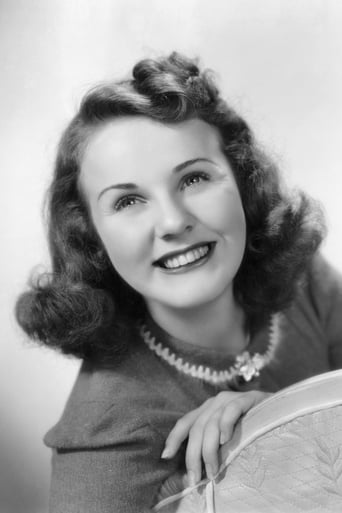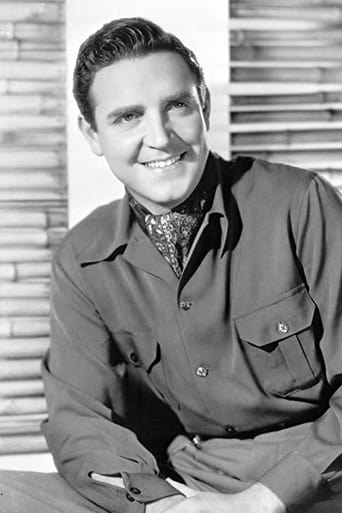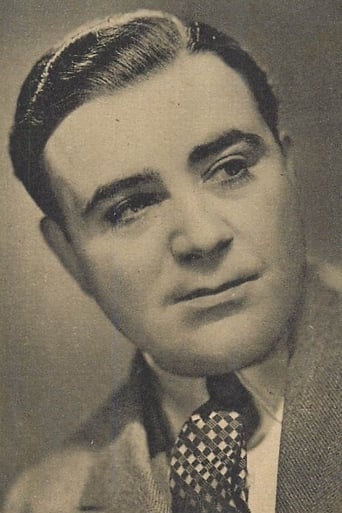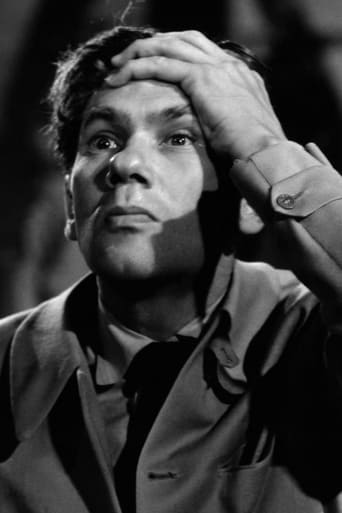Lucybespro
It is a performances centric movie
Listonixio
Fresh and Exciting
Intcatinfo
A Masterpiece!
ChanFamous
I wanted to like it more than I actually did... But much of the humor totally escaped me and I walked out only mildly impressed.
MartinHafer
"Can't Help Singing" isn't a bad movie. It's a pleasant time-passer. However, the film isn't any more--mostly due to too many forgettable songs and a paper-thin plot. Because of such movies as this, you can easily understand why the star, Deanna Durbin, only made 28 films and then retired--even though she was a top box office star.The film begins with Caroline (Durbin) insisting that she's going to marry some dashing cavalry officer. However, her father, the Senator (Ray Collins), isn't about to let her marry the guy. So she does what any impetuous and goofy young lady would do--she runs off and joins a wagon train heading west so she can find her sweetie. However, this incredibly naive lady ends up getting into no end of trouble. Eventually, she ends up going west with a professional gambler--and because they dislike each other so much, you just know that by the end of the film they'll be in love--such are the clichés in this movie.I would consider this brainless fun. As I mentioned above, the songs aren't very good and distract from the plot--not a major plus for the film. But the characters are kind of cute--even if Caroline is a bit flighty. Not a bad film, as it will keep your interest...except whenever she breaks into song!By the way, as a retired history teacher I should point out that the guns in this film are anachronistic. Everyone with a gun in this film has a revolver, though the film is set around 1847 and such weapons weren't widely used until around the Civil War.
Terrell-4
There is a reason Deanna Durbin was one of the top Hollywood stars from the mid-Thirties through the Forties. She was a natural actress with a fine face and figure and a deep- throated soprano she knew how to use. She was one of those people the camera loves. Her personality, direct and warm, comes straight across to the audience. She could handle all the immaculate make-up Hollywood gave her as she matured into a young woman, but there always was something of the tomboy about her. She had a natural exuberance, a sense of humor and a good-natured willingness to take pratfalls or march into mud-holes. And she was a professional at her craft. In this movie, Can't Help Singing, watch how she manages to wander through the woods singing, through bushes and over hillocks, avoiding branches, and periodically fronting pretty scenery. This scene is shot in long takes. I have no idea how many takes it took, but Durbin manages to move, sing, smile, emote a bit and hit all of her marks without any sign of effort or evidence of an editor's scissors used to mask mistakes. By the time Durbin was 14 she was major box office, and stayed there until she retired in 1950 at 29. She never liked the glitz and fan adulation of stardom. She and her third husband left for France right after she retired and that was that. She still lives just outside Paris, has turned down any number of film offers and hasn't granted an interview with anyone since 1949. As a person who was grounded in reality and decided to live her own life, Deanna Durbin gets a tip of my hat. Can't Help Singing is a lush, colorful musical about a young woman, Caroline Frost, daughter of a wealthy senator, who leaves Washington against the wishes of her father to meet the man she intents to marry. He is a cavalry lieutenant, and the senator has seen to it that his regiment has been sent to California to guard gold during the start of the Gold Rush. Caroline is determined, and along the way has to deal with steamboats, Russian con-men, a cross-country wagon, Indians, finaglers, grafters, boss-men and card sharps. The card sharp winds up holding more than cards. He turns out to be the romantic lead. After 90 minutes of songs, comedy, adventures and the occasional kiss, all ends well for everyone. This was Deanna Durbin's only color movie and the studio went all out. Can't Help Singing is stuffed with wide-open vistas, detailed studio sets and costumes that would make Vincente Minnelli envious. What makes the movie memorable, however (in addition to Durbin), are two songs from the score by Jerome Kern and E. Y. Harburg. From the moment the movie starts and we see Durbin driving a two-horse carriage singing "Can't Help Singing," it's time to sit back and smile. The number is one of those big, fat, intensely melodic songs that few composers besides Kern could pull off. She sings it twice, the last time part of a production that takes place in an outdoor western bath house. It pops up now and then as a melodic background line. The song works every time. The second Kern/Harburg show-stopper is "Californ-i-ay," where "the hills have more splendor; the girls have more gender." It's another major production number with a big melody and clever lyrics. Everyone and everything from the two leads to giant vegetables take part. The movie is pleasant enough, although the two Russian con-men get tedious and Durbin's leading man, while manly enough, doesn't make much of an impression. The movie belongs only to Deanna Durbin, as all of her films did. With those two songs from Kern and Harburg, it's worth spending some time with.
sdiner82
For reasons beyond comprehension, "Can't Help Singing" is a film no one I know has even heard of, much less seen, probably because Deanna Durbin, a child actress of the mid-1930s who blossomed into an alluring,witty, beautiful young woman in the 1940s, suddenly chucked her career in 1948, started a new life in the French countryside with her husband and subsequent children, and has never been heard from since. But, within a little more than a decade, she not only saved Universal studios from bankruptcy but was the most popular female star of her time. Watching her films today, one is amazed at how contemporary they--and she--are, particularly when she graduated from child star ("100 Men and a Girl," "Three Smart Girls") to a spunky young lady with a voice of pure velvet and a melting range of emotions (from rueful to sensual). "Can't Help Singing" is a luscious introduction to the timeless charm of Ms. Durbin. Her first--and only-- film in Technicolor, this lighthearted musical Western must have cost Universal a fortune--filmed mainly on outdoor locations in the Northwest, with one of Jerome Kern's most beautiful (and underappreciated scores). Forget the plot about a politician's daughter who, against her father's orders, heads West to track down her handsome cavalry lover (David Bruce) but, en route via covered wagon to the wild, wild West, finds herself locking horns--and finally arms--with a dashing, sarcastic cowboy (Robert Paige--whose good looks and soaring baritone are more than a match for Ms. Durbin's beauty and exquisite soprano).What counts is the ravishing color photography of Kern's songs--filmed on location in the great outdoors (the highlight, for me, is Ms. Durbin's soaring rendition of "Any Moment Now" filmed as she wanders through the breathtaking backdrop of Bryce Canyon--truly one of the most exquisite musical interludes in movie history). Add "More and More" (Oscar-nominated), "Californiay," and the knockout title song (performed by Ms. Durbin & Mr. Paige in adjoining outdoor bathtubs--don't ask!)and there's little more you could wish for in a movie--musical or otherwise. I've read that the film was a boxoffice disappointment and hastened Ms. Durbin's decision to call it quits a few years later. And most of the reviews I occasionally come across are generally lukewarm, if not hostile. Movie scholars might argue that, from an historical viewpoint, "Can't Help Singing" was an unintentional precursor of all the zesty, musical Westerns that were to enchant movie audiences during the next decade. Perhaps so. Who cares. I can't see how anyone can resist the once-in-a-lifetime glories of Deanna Durbin in her dazzling prime, the most beauteous use of Technicolor imaginable, and the entrancing melodies of probably our finest American composer, Mr. Kern. Thank you all very much.
tashman
In a decade devoid of great (non-MGM, non-Rita Hayworth) color musicals, CAN'T HELP SINGING deserves a more important place among the celebrated. A female-driven western tale preceding HARVEY GIRLS, ANNIE GET YOUR GUN, and CALAMITY JANE, while musically aping Broadway smash OKLAHOMA, this adaptation of GIRL OF THE OVERLAND TRAIL is the uniting of three great entertainment entities - Durbin, Jerome Kern, and the resources of the Universal Technicolor escapist machine. After losing Durbin's producer, Joe Pasternak, and her director, Henry Koster, to MGM, you'd think they would have tried more often, but no, Durbin's 1940s pictures were not expensively-mounted productions, and this is quite a distinctive product for 1943-4 Universal. However, not being a Durbin afficionado is probably the main reason this is my favorite Durbin vehicle. The superior if neglected Kern score awaits rediscovery, from the beguiling title tune (Durbin and company can't help singing from outdoor bathtubs) to lush ballads like "More and More" (also a big Perry Como hit), and a rousing, ersatz "Oklahoma" homage to "Californ-i-a." Without Maria Montez-John Hall to bolster, the populous if underused supporting company does well enough, with Robert Paige (a sort of poor man's John Carroll) not near so bad as I'd heard. Make no mistake, the "Durbin-ator" dominates the affair, surrounded by all the bright, lush colors of the Technicolor rainbow lavishly painting impressive backdrops of scenery, an extravagant, detailed, period wardrobe, and the Collector's Doll make-up adorning the star's perfect face. Durbin herself is at her gorgeous peak, and this colorful achievement is certainly the entertainment it set out to be.




